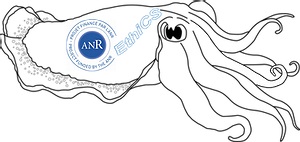
ETHiCS aims to provide new tools and knowledges to assess cuttlefish psychological suffering (negative emotion) or well-being (positive emotion). Second, by characterizing emotion-like behaviour in two related species, we expect general insights about functions development and evolution of emotions. Third, emotion-like behaviour will be used to determine whether an invertebrate mollusc can subjectively feel and be aware of an ambiguous situation. Last, ETHiCS will tackle the question of emotional traits their phenotypic plasticity within species by comparing individuals and their role of developmental environment in individual emotional traits will be determined within species and between species from the comparison of European and Asian cuttlefish.
The ultimate goal of this project is to understand the evolutionary root of animal emotion and primary consciousness, a fundamental issue in biology.
Objectives
The objectives of ETHiCS are organised as follows :
Objective 1
Describing emotion-like behaviour. ETHiCS aims to characterise, describe and assess both negative and positive emotion-related behaviour in two cuttlefish species when placed in different conditions. ETHiCS will establish an « emotion-like behaviour » which will expected to be a good predictor of cuttlefish comfort state.
Objective 2
Measuring emotion through cognitive biais. Once the objective 1 is achieved, cuttlefish, the emotional state of which are known will be confronted to more or less ambiguous choice (in a simple prey choice or after learning) to determine whether negative emotional state can induce « pessimistic » choice. Then placing individuals in a two-way choice task will expected to be an additional and complementary predictor of cuttlefish welfare.
Objective 3
Measuring emotion induced by an ambiguous choice making. Ambiguous choice could induce positive or negative emotion if the individual is mentally able to « keep in mind » what it did not choose and its potential gain or loss. This would be an alternative way to test whether a cuttlefish is capable of subjective mental representation of the consequences of its own behaviour (phenomenal consciousness). As a consequence, it is expected that ambiguous two-way choice can also be used to evidence primary (phenomenal) consciousness skills in cuttlefish.
Objective 4
Effects of individual and species history in emotional traits. By exploring emotional traits of individual when previously reared in different conditions (within species study) or when evolved in very different environments (comparative/between species study), it is expected to determine the relative « weight » of individual vs. species history in emotionnal profiles of cuttlefish.

